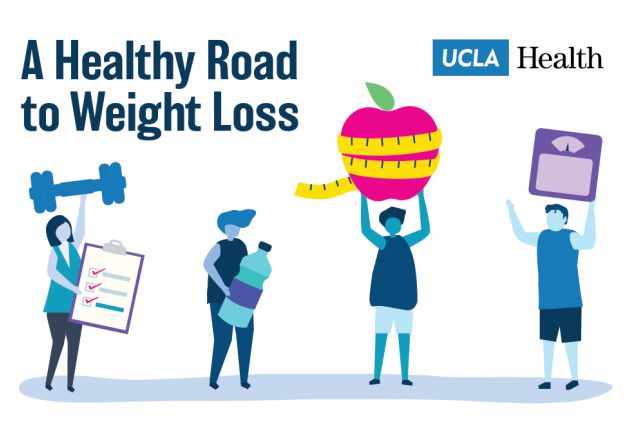Weight loss is not always correlated with aesthetics or, for that matter, being healthy, and simply standing on a scale is an inexact way to gauge your health.
Rather than looking at numbers, it is best to focus on overall health, said Deviny Mo, manager of UCLA Health Sports Performance powered by Exos.
“Ultimately, it comes down to what you want to achieve. If somebody wants to lose weight to look better, then using a scale may not be the best way to track that,” Mo said. “As you lose body fat, you may be gaining muscle, and muscle is denser and, so, weighs more.”
More than one way to weigh progress
One way to track progress is to measure your percentage of body fat, but doing so requires some specialized knowledge and equipment and may not be available for everyone. A more accessible approach to tracking your progress might be to periodically take photos of yourself in a mirror.
Or, rather than focusing on aesthetics, pay attention instead to your performance as you exercise.
“You can make your goal to get stronger and track how much weight you’re lifting,” Mo said. “You can track your activities and how you’re feeling before starting a training session.”

Gauging health with these essentials can help with weight management
There are many ways you can measure your physiological health in addition to weight management:
- Hydration: Drink plenty of water. Adequate hydration is essential for your body’s overall function; it helps to boost your metabolism, curbs your appetite and increases exercise proficiency.
- Food intake/nutrients: Eating foods such as fruits and vegetables that are rich in vitamins, antioxidants and phytochemicals can help balance overall health and weight management.
- Bowel movements: It is no secret that regular exercise and eating foods high in fiber can lead to healthy bowel movements. Regular bowel movements don’t necessarily equate to long-term weight loss, but they are beneficial in .
- Mood/physical vigor: How you feel on a daily basis can determine your exercise and eating habits. Foods can affect our mood and, conversely, your mood sometimes can influence the foods you eat. Adding foods such as to your diet can help to boost your mood.
- Rest: Getting a sufficient amount of sleep each night can help regulate your appetite and calorie intake. Multiple research studies have shown that people who regularly lack proper sleep often .
Track internally as well as externally
We are culturally conditioned to look at our outward appearance first, before we examine our internal attributes – or those of another person.
But when it comes to weight management, it is important to examine ourselves from the inside out. Weight management begins with an internal accounting.
“Evaluate from within,” Mo says. “Ask yourself questions like, ‘How am I feeling? Do I feel energized? Am I ready to tackle the day? Do I have enough motivation?’ If you’re looking great in the mirror but are starving yourself to get to that number,” she concludes, “then your quality of life probably isn’t that great.”
Find out more about tracking your health progress.



